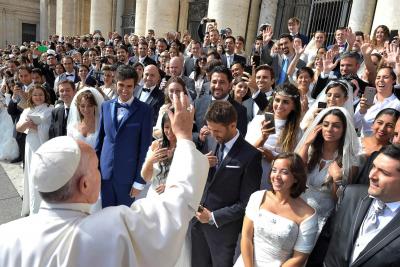This is a guest post by Dr. Alessandro Rovati.
Many commentaries about Pope Francis’ Apostolic Exhortation Amoris Laetitia focused on the hot-button issue of the pastoral care of the baptized who are divorced and remarried. A couple of months after the Exhortation’s release, I think it would do us good to take a step back from the heated polemics that filled the media to appreciate the depth and breadth of Francis’ proposal. If we want for this document to change us and the lives of our communities, we need to have the patience to identify with the gaze embodied by Pope Francis, that we may make it our own and be guided by it in our relationship with ourselves and others.
Centered in Christ
The first invitation that emerges time and again in Francis’ Exhortation is to put Christ at the center of our living and thinking. Echoing Gaudium et Spes, the Pope insists that the Church and Christian families need to immerse themselves once again in the mystery of the Incarnate Word so that they might learn the truth about human relationships. Families should be centered in Christ so that he might unify and illumine their entire lives and thus help them to see beyond the others’ limitations and seek their good, rather than one’s own projects and interests. In turn, the Church as a whole is also called to turn her gaze to the living Christ because “the example of Jesus is a paradigm for the Church.” (64) Jesus offered his boundless love without exception, and the Church needs to make the Lord’s attitude her own, imitating him who goes out to everyone.
Much has been said about the pastoral nature of the exhortation, but we should not forget that for the Pope pastoral care is nothing else than seeing things with the eyes of Christ. It is this Christ-centered gaze that shapes Francis’ response to struggling families, including those who live in so-called “irregular” situations. The Pope’s insistence that they need to be helped in finding their proper way of participating in the ecclesial community cannot be separated from his desire for the Church and all the faithful to better embody Christ’s loving gaze in their lives. Francis, in fact, sincerely believes that “Jesus wants a Church attentive to the goodness which the Holy Spirit sows in the midst of human weakness, a Mother who, while clearly expressing her objective teaching, ‘always does what good she can, even if in the process, her shoes get soiled by the mud of the street.’” (308) Following in the footsteps of Jesus, the Church never tires of proclaiming the demands of the Kingdom, while at the same time looking to people and their weakness with love and tenderness, accompanying their steps in truth, patience and mercy.
From Lament to Witness
By emphasizing the need to be rooted in the Word of God, Francis is not inviting us to be distracted by abstract ideas or celestial pictures that ignore the actual condition of families. Just the opposite, Francis insists on the need to focus on concrete realities because “the call and the demands of the Spirit resound in the events of history.” (31) Paying attention to our present situation entails realizing that we live in a time where cultural and economical factors militate against permanent decisions and family life. Because of economical struggles that make the future uncertain, of the “culture of the ephemeral” that reduces everything to what can be possessed and quickly discarded, and of the legal deconstructions of the family, we are confronted with a reality that does not allow the uncritical survival of older forms and models.
In such context, we face the urgent need of rediscovering and proposing anew the beauty of marriage, shifting from the defensive denouncing of a decadent world to “being proactive in proposing ways of finding true happiness.” (38) Instead of being discouraged and trapped into wasting our energy in doleful laments, the Pope invites us to look at the current challenges as a “summons to revive our hope and to make it the source of prophetic visions, transformative actions and creative forms of charity.” (57) We are called to a renewed missionary impetus that with creativity goes out to where people are, not limiting ourselves to being like the beacon of a lighthouse for those who are seeking help, but becoming like a “torch carried among the people to enlighten those who have lost their way or who are in the midst of a storm.” (291)
To adopt a missionary style, Francis stresses that it is necessary to concentrate on the essentials, on what is “most beautiful, most excellent, most appealing and at the same time most necessary.” (58) The announcement of the saving love of God made manifest in Jesus Christ needs to be put at the center of our evangelizing activity so that people might discover that the Gospel responds to the deepest expectations of the human person. Nothing is more important to this renewed missionary evangelization than the joy-filled witness of families that by reflecting the beauty of the Gospel in their lives arouse the desire for God in those they meet. With a beautiful expression, Francis invites us to let “our lives become wonderfully complicated” (308) because of our willingness to get involved with people’s lives to announce to them the Good News and help them grow in appreciation of its demands.
A Journey of Freedom
In a passage that shows Francis’ impressive capacity to discern the signs of the time, the Pope warns us that “today, it is less and less effective to demand something that calls for effort and sacrifice, without clearly pointing to the benefits which it can bring.” (265) This means that the mere proclamation of the truths of faith is not enough to convert people’s hearts. For our witness to impact the lives of others, we need to help them arrive at the point where they perceive that what is announced as objectively good is also good for them here and now. Without this step, the Church’s teachings end up being perceived as a burden, rather than a source of joy.
For the same reason, Francis wants the Church to form consciences, rather than replace them. To grow in maturity and certainty, a person needs to learn the capacity to use freedom wisely and responsibly so that she may act intelligently and prudently whenever challenges arise. As families do with their children, the Church too needs to educate people by cultivating their freedom so that each one may “act out of conscious and free choice, as moved and drawn in a personal way from within.” (267)
Moral education, though, does not happen all of a sudden, rather it a journey made of small steps. No one drops down from heaven perfectly formed, and everybody needs constantly to grow and mature in the ability to love. Francis encourages us to “stop demanding of our interpersonal relationships a perfection, a purity of intentions and a consistency which we will only encounter in the Kingdom to come.” (325) Instead of being scandalized by our weaknesses and limitations, we should be aware that a person always knows, loves and accomplishes the good by different stages of growth, thus trusting that “the Lord’s presence dwells in real and concrete families, with all their daily troubles and struggles, joys and hopes.” (315) This is the true source of our joy and of our hope, one that makes us eager to follow Francis’ final invitation as we continue our journey of faith: “Let us keep walking together. What we have been promised is greater than we can imagine. May we never lose heart because of our limitations, or ever stop seeking that fullness of love and communion which God holds out before us.” (325)




Dr. Rovati, I appreciate your comments on our Holy Father’s words, but I am left unsure of exactly what you are getting at here. That we ought to be centered on Christ is clear and true and that Christ came for us all is certain, however, there is a certain and present danger if we are to be complacent or to be presumptuous about our Lord’s generosity and this could cost us eternity.
I appreciate most of what Pope Francis says, as do you, but maybe you could clarify what it means or what it looks like for a faithful Catholic to look “to people and their weakness with love and tenderness, accompanying their steps in truth, patience and mercy.” How ought the faithful Catholic being led by the wisdom of Pope Francis carry out this commission? Perhaps specifically related to how we might evangelize those in “irregular” families?
I thank you in advance for your reflective response. SJ